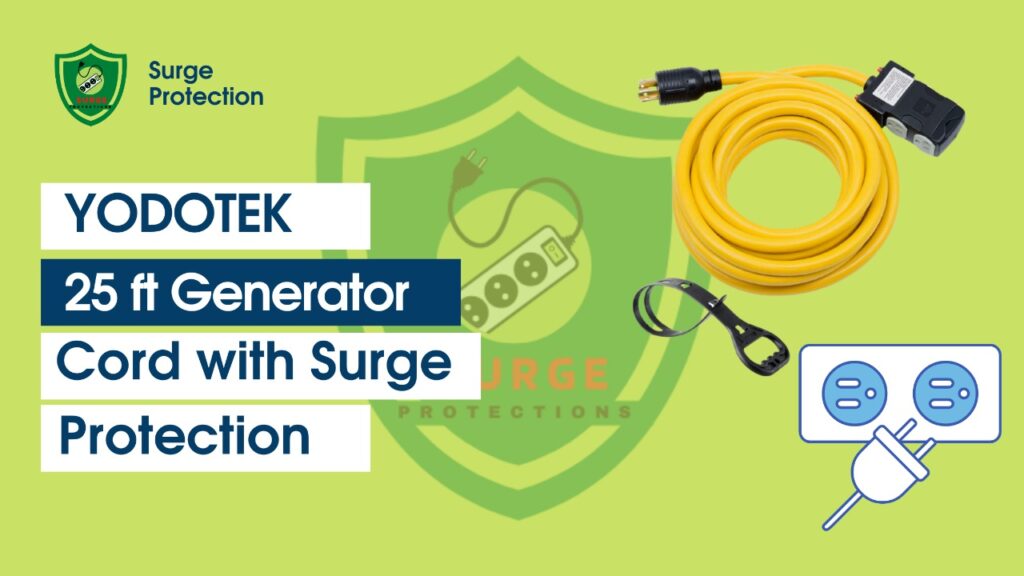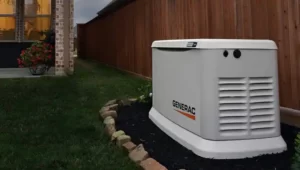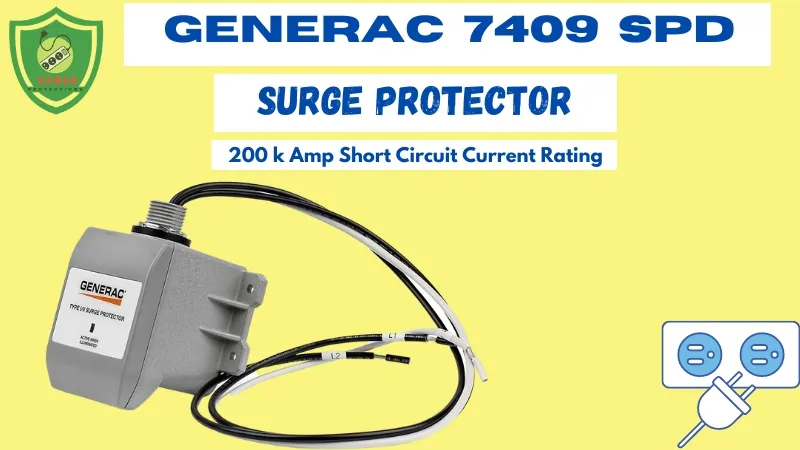Importance and Protection of Electricity Generators:
The importance of protecting an electricity generator from power surges cannot be overstated. Generators serve as reliable backup sources of power, ensuring uninterrupted electricity supply during emergencies or in areas with limited access to the main power grid. However, these vital machines are not immune to the damaging effects of power surges. Power surges can occur unexpectedly, leading to excessive voltage levels that can harm the sensitive electrical components within the generator.
Protecting the generator from surges is essential to safeguard its performance, prevent costly repairs, and extend its lifespan. By utilizing surge protection devices specifically designed for generators, such as surge suppressors or surge protectors, you can effectively mitigate the risk of power surges and ensure the reliable operation of your electricity generator. These protective measures provide peace of mind, allowing you to rely on your generator during critical times without worrying about the potential damage caused by electrical disturbances.
To tackle these problems, professionals recommend using a surge protector.
You can use a whole-house surge protector to save your home appliances, but what if electricity blacks out? What if it forces down to use another source of energy? Mostly, that would be a generator. So here we will help you to find the Best Surge Protector for your generator.
A generator will be the best go-to device if electric conditions don’t work for you. Here is a question that might come to your mind.
Can generators cause surges?
Yes, generators can cause power surges that may harm your pieces of equipment’s health. There can be many reasons that cause a generator to surge.
- It can be the Old Age of the generator. As generators age, their components start to fade out due to normal wear and tear. It is apt for them to surge.
- It can be Fuel problems that cause surging. There are three scenarios in this case. 1. incorrect fuel, 2. low fuel levels, or 3. poor fuel quality. Most generators have specific fuel requirements. Using any other fuel outside of those parameters can cause operational issues, including surges.
- Poor maintenance of the generator is also a major reason for surging.
- Other reasons include Unbalance load, Erratic motors, Intermittent AVR failure, faulty plugs, etc.
The surge coming from the generator is a pretty bad thing, right? Suppose electricity already blacked out and this condition forced to use a generator that is causing unbalance voltages. Your pieces of equipment are at greater risk in this situation.
We recommend you use a surge protector with the generator.
Now many of you be thinking, “Hey, how can we use a surge protector with a generator?”
You can use a surge protector with a generator. There are generator-specific surge protectors available in the market. Actually, a surge protector is a power strip with the ability to diffuse unbalanced loads of voltages down and prevent harming your device.
Generator-specific surge guards are created to withstand wide fluctuations in voltage, and they are wired and installed for the specific purpose of protecting your equipment. This means that, during a power disturbance, these devices can endure higher electricity spikes, shielding your appliances from more electrical damage.
Okay, that is totally fine. We can use a surge protector with a generator but is it safe to use so?
Is it safe to use a surge protector with a generator?
Generators are very hazardous items. They are very turbulent and can generate toxic fumes, so you have to keep them outside.
If you want to bring power to any of your appliances, use a surge protector extension cord.
These are attractive. These come in higher gauges and are insulated against elements like sunlight and moisture.
They have two main advantages.
- They provide protection against fires and electrocutions.
- They extend and provide more outlets for the generator in your home.
What if the generator blew up the surge protector?
Surge protectors are power strips with the ability to diffuse unwanted loads that may harm your appliances. Berkley Lab ETA Safety suggests surge protectors can carry only a particular load.
If you treat your low-range surge protector with a higher voltage frame, it will definitely blow off.
Before buying a generator, you should check the total wattage of all the devices you want to power. The capacity of the generator you select should be 1.5 times greater than the total wattage of all the devices you want to use with the generator.
But it is not enough to buy a generator with the right capacity. If the surge protector is not rated to carry the load of all the appliances you have connected to your generator, it could blow.
Some of you might be heard that generators didn’t mainly cause surges often.
OR
Which type of generator causes more surges?
Types of Generators:
There are two categories of generators present. Each category of generator has two types further.
Conventional Generators VS. Inverter Generators:
Conventional generators run at 3600 rpm and kind of fluctuates. They produce minor drops and surges in power. On the other hand, inverter generators only give your home as much energy as it needs at any time. They are not apt to surge.
| Aspect | Conventional Generators | Inverter Generators |
|---|---|---|
| Design and Technology | Mechanical | Electronic |
| Power Output and Capacity | Higher capacity | Lower capacity |
| Fuel Efficiency | Lower | Higher |
| Noise Level | Louder | Quieter |
| Portability and Weight | Heavier and bulkier | Lightweight |
| Voltage and Frequency Output | Less stable | Stable and precise |
| Suitable Applications | Construction sites, industrial use | Camping, outdoor activities, sensitive electronics |
| Cost | Generally cheaper | Relatively more expensive |
Portable Generator VS. Standby Generators:
Portable generators are small devices that we can move effortlessly. They can produce enough power to run a house. Standby generators have one thing similar to portable generators that they can run a home. The standby generator automatically turns on when the power goes down, while the portable generator requires a manual start. So, a portable generator can sometimes cause a surge.
| Aspect | Portable Generators | Standby Generators |
|---|---|---|
| Power Output | Lower to Medium | Medium to High |
| Portability | High | Low |
| Fuel Source | Gasoline, diesel, propane | Natural gas, propane, diesel |
| Installation | No installation required | Permanent installation needed |
| Usage | Temporary power needs (e.g., camping, construction) | Backup power for entire home or business |
| Automation | Manual startup and operation | Automatic startup during power outages |
| Cost | Lower initial cost | Higher initial cost |
| Maintenance | Regular maintenance required | Periodic maintenance recommended |
Here is a simple guide of the characteristics to keep in mind when buying a surge protector for a generator.
Clamping Voltage: Clamping voltage is the minimum amount of voltage that causes a surge protector to direct excess power to the ground. The lower the clamping voltages, the earlier will be the activation of surge protection, and the better will be the protection.
Joule Rating: If you want to know the point at which your surge protector stop working, you need to check out its joule rating. You need a surge protector with the maximum value of joule rating.
UL Rating: A good surge protector has always been tested by independent laboratories. You should always check up on the UL rating before buying a surge protector to avoid any mishap in the future.
Lights: A surge protector should have lights that indicate its life expectancy. It should alert whenever they encounter a spike to find a replacement before the next surge occurs.
Read Also: How to test a Surge Protection device
Some top best surge protectors for generators voted by the professionals:
POWSAF Surge Protector 4100 Joule & 30 Amps:
POWSAF surge protector is one of the best, got excellent value-for-money surge protector rated at up to 30 amps with a Diagnostic LED indicator to help identify potential trip hazards.

| PROS | CONS |
|
|
Yodotek 25Ft Generator Cord with Surge Protector Breaker
Yodotek is a HEAVY DUTY GENERATOR EXTENSION CORD with 4×10 SJTW gauge cable that can run the max wattage of 7500 watts, power of 30 Amp 125/250 volts, a good generator adapter for emergency use.

| PROS | CONS |
|
|
Surge protector for the Standby generator
A surge protector is crucial for a home standby generator to safeguard the electrical circuits and devices in your home. When a standby generator kicks in during a power outage or fluctuation, it can sometimes produce voltage surges or fluctuations. These surges can potentially damage sensitive electronics and appliances in your home.

Therefore, standby generators require surge protection to prevent such issues. Surge protection devices can be installed at your main electrical panel or used for individual devices to divert excess voltage safely to the ground. This helps protect your home’s electrical system and the valuable equipment connected to it, ensuring the safe and reliable operation of your standby generator.
Best Surge Protector for Standby Generator
Generac 7409 SPD Surge Protector is the best choice for any standby generator because it is specially designed for Standby heavy devices it have many fantastic features that make it the best choice overall surge suppressor in the market.
Generac 7409 SPD Surge Protector
The Generac 7409 SPD Surge Protector is here to provide that crucial layer of protection, safeguarding your valuable investment against power surges and voltage spikes. With a suite of impressive features, this surge protector is a must-have for anyone relying on standby generators.

Key Features:
The Generac 7409 SPD Surge Protector offers an impressive surge current capacity of 50 k Amps per phase, ensuring robust protection against electrical surges and voltage spikes. Its substantial 200 k Amp short circuit current rating further enhances its protective capabilities, guaranteeing the safety of your standby generator. The surge protector comes conveniently pre-wired with 24 inches of 12-gauge wire for L1, L2, and N connections, simplifying the installation process.
Its 1/2-inch nipple mount design ensures secure and hassle-free attachment to your generator. Encased in a durable NEMA 4X enclosure, it can withstand harsh weather conditions, making it a reliable choice for outdoor use. Despite its powerful features, the surge protector maintains a compact form factor, measuring just 4.29 x 4.02 x 2.52 inches and weighing only 13.9 ounces. Manufactured by Generac, a trusted name in the industry, the Generac 7409 SPD Surge Protector is a dependable solution for safeguarding your standby generator, ensuring uninterrupted power during critical times.
| Specification | Details |
|---|---|
| Product Name | Generac 7409 SPD Surge Protector |
| Surge Current Capacity (Per Phase) | 50 k Amps |
| Short Circuit Current Rating | 200 k Amps |
| Pre-wired Wire Length (L1, L2, N) | 24 inches of 12-gauge wire |
| Mounting | 1/2 Inch Nipple Mount |
| Enclosure | NEMA 4X |
| Product Dimensions (L x W x H) | 4.29 x 4.02 x 2.52 inches |
| Item Weight | 13.9 ounces |
| Manufacturer | Generac |
| Item Model Number | 7409 |
Generac 7409 SPD Surge Protector is a compact yet powerful device designed to safeguard your standby generator from electrical surges, ensuring that it remains in peak operating condition for years to come.
With its impressive surge capacity, short circuit protection, and easy installation, this product provides peace of mind in an unpredictable world. Don’t leave your generator vulnerable to power fluctuations; invest in the Generac 7409 and enjoy uninterrupted power when you need it most.
Conclusion about best surge protector for generator:
Generators are the devices used to supply power when the electricity goes down. However some generators (non-inverters) produce poor surges that can destroy your sensitive components.
People should use a surge protector with their generators to avoid surges, redirecting excess load to the ground.
Related: Best Surge Protector for Refrigerator
Some Aditional Information
What is an Electricity Generator and How Does it Work?
An electricity generator is a machine that converts mechanical energy into electrical energy. It does this by using a rotating shaft to induce an electric current in a coil of wire. The rotating shaft can be powered by a variety of sources, including gasoline, diesel, natural gas, or even wind or water.
Generators are used in a wide variety of applications, including:
- Powering homes and businesses during a power outage
- Providing backup power for critical infrastructure
- Generating electricity in remote areas
- Charging batteries
How Surge Protectors Protect Electricity Generators?
Surge protectors are devices that help to protect electronic equipment from power surges. Power surges can occur for a variety of reasons, including lightning strikes, power outages, and switching on or off large appliances. When a power surge occurs, it can send a sudden burst of voltage through the electrical system. This can damage sensitive electronics, such as computers, TVs, and appliances.
Surge protectors work by diverting the excess voltage away from the electronic equipment. They do this by using a variety of methods, including capacitors, resistors, and varistors. Surge protectors can be installed on individual appliances or on the main electrical panel.
How to Avoid Inconvenience with Electricity Generators?
There are a few things you can do to avoid inconvenience with electricity generators:
- Make sure the generator is properly sized for your needs. If the generator is too small, it will not be able to provide enough power to your appliances.
- Install a surge protector on the generator. This will help to protect your appliances from power surges.
- Keep the generator clean and well-maintained. This will help to ensure that it runs properly.
- Store the generator in a safe place. This will help to prevent it from being damaged.
Can you use a surge protector with a generator?
Absolutely, emphatically, YES, you should use a surge protector with your generator! It’s a crucial step to ensure the safety and longevity of both your generator and the valuable electronic devices you connect to it. When you’re relying on a generator, especially during power outages or in areas prone to electrical fluctuations, the risk of voltage spikes and surges is real. Without a surge protector, your sensitive equipment could be at risk of damage or failure due to these electrical anomalies.
By investing in a high-quality surge protector and connecting it between your generator and your devices, you’re adding a powerful shield against these potentially devastating power surges. Make sure to select a surge protector with a rating that matches the output of your generator and the needs of your connected equipment. Don’t take chances – protect your investment and ensure reliable power during critical times by using a surge protector with your generator.
Conclusion
Electricity generators are a valuable tool for providing backup power during a power outage or for powering appliances in remote areas. By using a surge protector and following these tips, you can help to ensure that your generator will provide reliable power and avoid inconvenience.
Additional Information
Here are some additional tips for avoiding inconvenience with electricity generators:
- Do not overload the generator. This can damage the generator and could even cause a fire.
- Use the correct fuel. Not all generators can run on all types of fuel. Make sure to use the correct fuel for your generator.
- Keep the generator away from flammable materials. This will help to prevent a fire in the event of a leak or spill.
- Do not operate the generator in enclosed spaces. This can produce harmful fumes.
I hope this blog post has been informative. If you have any questions, please feel free to leave a comment below.

Unless I missed it within your lengthy information, I was looking for a Surge Protector “FOR” the standby generator. I have a “Generac 22KV” standby generator and it experienced a “Spike” and blew out my controller card, (cost ~$950.00 plus labor) . This happened two times, once with nearby lightning and once with a surge/spike of line voltage. I already have a “Whole House” surge protector. Does one exist for the generator? If so, who, where & how is wired in? Info please. John
Hey John,
Thank you for contacting and we apologise for the late respose. I will suggest you to replace your whole house surge protector with Bad Wolf HSD240V (https://amzn.to/3ZcSSmZ).